Constitutions and Statutes - The Mill Hill Missionaries
Constitutions and Statutes - The Mill Hill Missionaries
Constitutions and Statutes - The Mill Hill Missionaries
You also want an ePaper? Increase the reach of your titles
YUMPU automatically turns print PDFs into web optimized ePapers that Google loves.
NATURE AND SCOPE OF THE SOCIETYPart I : Our Missionary ApostolateC1C2C3C4C5C6We are an international fellowship of missionaries,named St. Joseph's Missionary Society of <strong>Mill</strong> <strong>Hill</strong>.We are a Society of Apostolic Life <strong>and</strong> PontificalRight, consisting of ordained <strong>and</strong> lay Members,dedicated to the missionary apostolate.Alongside its Members, the Society values thecollaboration of Associates, ordained <strong>and</strong> lay peoplewho make a temporary commitment to share inour missionary apostolate. Associates are governed bytheir own <strong>Statutes</strong>.As a Society we are committed to acting on thesewords of Christ: "Go, therefore, make disciples of allnations...", <strong>and</strong> we are ready to leave our country <strong>and</strong>our own culture. (Cf. Prologue <strong>and</strong> C 8)In determining our fields of labour we look for theguidance of the Holy Spirit, which comes to us throughthe inspiration of Herbert Vaughan, through relevantinstructions of the Church, the discernment of ourGeneral Chapters <strong>and</strong> the General Council, <strong>and</strong>through reading the signs of the times.Jesus brought the Good News to the poor. Our Founderasked us to go where the need is greatest, to the people"most ab<strong>and</strong>oned <strong>and</strong> poorest in the means of grace".<strong>The</strong>refore we still go by preference to the poor, to theoppressed <strong>and</strong> to those in greatest need.1
C7In evangelisation, our preference is for pioneeringwork: to open up new fields, to respond boldly tofresh needs <strong>and</strong> face unfamiliar challenges.C8 We approach people of different races <strong>and</strong>religions, seeking, in a spirit of dialogue, to listen tothe Spirit speaking in their cultures <strong>and</strong> traditions.We do this within the context of the Local Church,under the leadership of the Ordinary, striving tobuild up the Christian community as a signpost of theKingdom, <strong>and</strong> helping it to realise its missionarycalling.C9C10C11D12We are conscious of a special obligation to serve thepeople with whom we have worked in the past <strong>and</strong>with whom we have established firm ties. However,as missionaries, we always remain ready to moveto where the need is greater.We strive to evaluate our work from time to time interms of the Gospel <strong>and</strong> our apostolic mission, <strong>and</strong>, indialogue with the local church <strong>and</strong> others, seek tomake it more effective. In a spirit of service we areready, according to local need, to accept positions ofresponsibility <strong>and</strong> to withdraw from them, so as tofacilitate the passing on of leadership to the localChurch.We are also present as missionaries in our churches oforigin, carrying out our missionary apostolate there invarious ways.It does not fall within the scope of the Society to havelong-term parish commitments except when this isthought to be essential to the furthering of the proper2
aim of the Society. However, when parishcommitments are arranged, preference is given toparishes with a missionary character or with apoorer population.C13 Members who are sick or retired continue toparticipate in the mission of the Society byfollowing its way of life, sharing its missionaryconcern, <strong>and</strong> offering their prayers <strong>and</strong> sacrifices forthe good of all.Part II: Our Way of LifeC14 Our apostolic mission determines our spirituality.Through our apostolic zeal, our prayer, our faithfuldedication to given tasks, our readiness for steady <strong>and</strong>hard work as missionaries, we strive to become likeChrist, growing in holiness <strong>and</strong> fervour of spirit.Through the Missionary Oath we dedicate ourselvesfor life, to be available for the work of the Society<strong>and</strong> its mission. (Cf. Prologue – Our Identity)C15C16In view of our life-long dedication to missionaryservice, we commit ourselves to live in chastity <strong>and</strong>celibacy, for the sake of God's kingdom. We alsocommit ourselves to observe the Society’s Code ofConduct.Our Founder was deeply convinced that the spirit <strong>and</strong>practice of evangelical poverty is the foundation of theapostolic life. Our work for the Society <strong>and</strong> mission isgiven freely, <strong>and</strong> any money or recompense for ourwork belongs to the apostolate of the Society.C17 Our missionary vocation brings us together as one3
community of faith <strong>and</strong> love, especially in thecelebration of the Holy Eucharist, which is central toour lives <strong>and</strong> work. We are, accordingly, committed tofollowing Christ through a life of prayer bothpersonal <strong>and</strong> common, to living <strong>and</strong> working with eachother <strong>and</strong> with our co-workers, supporting <strong>and</strong>encouraging one another. (Cf. Prologue, OurFoundation)D18We call upon our patron saints to intercede for us <strong>and</strong>inspire us on our missionary journey:MARY IMMACULATE, Mother of the Church <strong>and</strong> Queenof the Apostles (DEC.8 TH )ST. JOSEPH, Protector of the Church <strong>and</strong> PrincipalPatron of our Society (MAR. 19 TH )ST. PETER, first of the Apostles <strong>and</strong> head of the Church(JUNE 29 TH )ST. PAUL, chosen instrument for the conversion of thenations (JUNE 29 TH )ST. FRANCIS OF ASSISI, proclaimer of Christ in thesimplicity of his life (OCT.4 TH )ST. FRANCIS XAVIER, model of missionary zeal <strong>and</strong>ministry (DEC.3 RD )ST. TERESA OF AVILA, missionary by desire in herspiritual journey (OCT 15 TH )STS. PAUL MIKI AND HIS COMPANIONS, missionarymartyrs of Japan (FEB. 6 TH )STS. LORENZO RUIS AND HIS COMPANIONS,missionary martyrs of Japan (SEPT. 28 TH )ST. PETER CLAVER, apostle of the enslaved in theAmericas (SEPT. 9 TH )ST. TERESA OF LISIEUX, patroness of missionaries <strong>and</strong>missions (OCT. 1 ST )STS. CHARLES LWANGA AND HIS COMPANIONS, firstmartyrs of Ug<strong>and</strong>a (JUNE 3 RD )4
C19C20C21C22In charity we pray for one another, both for those whoare living <strong>and</strong> for those who have died. We also prayin gratitude for all those who help <strong>and</strong> support us inour missionary apostolate. In our communities wepray for living Members, Associates <strong>and</strong> benefactorsduring the month of June, <strong>and</strong> in November we prayfor deceased Members, Associates <strong>and</strong> benefactors.We also pray during the Holy Eucharist, in accordancewith our status, for any Member or Associate who hasdied.We have a special concern for sick, elderly <strong>and</strong> retiredmissionaries. We express this concern through ourhouses of retirement, through ensuring timely <strong>and</strong>competent medical care, <strong>and</strong> through personalkindness, attention <strong>and</strong> visits.As a Society, we value self-reliance, personal initiative<strong>and</strong> creativity, <strong>and</strong> respect for each other’sindividuality, always balanced with a concern forthe community.Together with the Eucharist, spiritual direction, regularrecourse to the Sacrament of Reconciliation,Recollection Days, <strong>and</strong> annual Retreats, are ourstrength <strong>and</strong> support in our active apostolate.5
MEMBERSHIPADMISSION INTO THE SOCIETY (23 – 25)FORMATION (26 – 28)TEMPORARY MEMBERSHIP (29 – 32)PERPETUAL MEMBERSHIP (33 – 37)PERPETUAL MEMBERS AND ASSOCIATES (38 – 43)SEPARATION FROM THE SOCIETY (44 – 50)Admission into the SocietyC23C24C25Members of the Society are those who, wishing todedicate themselves for life to the service of mission,pledge themselves by oath to the Society.We invite, <strong>and</strong> admit to membership in St. Joseph'sMissionary Society of <strong>Mill</strong> <strong>Hill</strong>, suitable c<strong>and</strong>idateswho desire to work for the aims <strong>and</strong> scope of theSociety as ordained or lay Members. Admission topermanent membership is preceded by a period ofTemporary Membership, as a time of preparation<strong>and</strong> formation. C<strong>and</strong>idates become TemporaryMembers by taking the Temporary Oath.<strong>The</strong> Missionary Oath is taken in the presence of theGeneral Superior or his delegate. A copy of the Oathis signed by the Member, the General Superior or hisdelegate, <strong>and</strong> by two witnesses, <strong>and</strong> is kept in thearchives of the Society.FormationC26<strong>The</strong> Society takes on itself responsibility for theformation of all who wish to join it. <strong>The</strong> purpose6
,of the formation programme is to enable c<strong>and</strong>idatesto develop a deep relationship with Christ, to discerntheir missionary vocation <strong>and</strong> to be suitably preparedfor the mission <strong>and</strong> way of life of the Society.Directly responsible for formation are those who havebeen entrusted with it by the General Council.C27C28Before an applicant is admitted to the Society'sformation programme, the following papers arerequired: certificates of Baptism <strong>and</strong> Confirmation; amedical report of good health; an adequate report<strong>and</strong> good references from the Parish Priest <strong>and</strong> ParishCouncil, <strong>and</strong>, where applicable, from employers.<strong>The</strong> formation programme emphasises our commontradition <strong>and</strong> fellowship, our missionary spirit <strong>and</strong> theinternational character of the Society. Specialattention is given to policies <strong>and</strong> guidelines laid downby the Society. With regard to training for thepriesthood, the relevant documents of the Church <strong>and</strong>instructions of the Holy See are adhered to.Temporary MembershipC29C30Before any c<strong>and</strong>idate is admitted to TemporaryMembership, all concerned are consulted as to hissuitability, including the members of the community towhich he belongs. <strong>The</strong> Regional or SocietyRepresentative with the consent of his Council,<strong>and</strong> in consultation with the General Council,makes the decision concerning admission. Withregard to the suitability of c<strong>and</strong>idates, Cans. 642 –645 of C.I.C. also apply.<strong>The</strong> duration of Temporary Membership will normally7
C32 A Temporary Member of the Society has thefollowing rights:a. to training <strong>and</strong> formation which will enablehim to realise his desire to become an ordained orlay Member in the Society;b. to board <strong>and</strong> lodging, <strong>and</strong> to temporal support,appropriate to his status;c. to spiritual support <strong>and</strong> prayers from fellowmissionaries.Perpetual membershipC33C34C35At the appropriate stage, a Temporary Member willpresent himself to the General Superior for acceptanceas a Perpetual Member. After the usual procedure ofconsultation governing admission (cf. C 29), theGeneral Superior, with the consent of his Council, willmake a decision about his acceptance. If the decisionis positive, the c<strong>and</strong>idate will be invited to take thePerpetual Oath. This will be followed by ordinationto the Diaconate in the case of c<strong>and</strong>idates forpriesthood.By the Perpetual Oath the c<strong>and</strong>idate is grantedpermanent membership in the Society. If he isordained, he is incardinated into the Society. (Cf. C 24)Through the Perpetual Missionary Oath, a Membercommits himself:a. to a life-long dedication to the missionary9
apostolate of the Society, in obedience to theGeneral Superior;b. To living an apostolic life according to the<strong>Constitutions</strong> <strong>and</strong> Directives of the Society (cf. C 14 &C 15);c. to giving his work freely, without payment,throughout his life (cf. C 16);d. ‘to a generous loyalty to the Society, serving it<strong>and</strong> promoting its efficiency to the best of hispowers' (Cardinal Vaughan).C36A Perpetual Member of the Society has the followingrights:a. to board <strong>and</strong> lodging, <strong>and</strong> to a personalallowance;b. to companionship, to hospitality, <strong>and</strong> the supportof an apostolic community in fulfilling his missionarytask (cf. C 17);c. to periodic holidays (cf. D 40); to care insickness <strong>and</strong> in old age; <strong>and</strong> to provision of such needsas have been recognised by the Society;d. to spiritual support from fellow missionariesduring his life as well as prayers for him after death;e. to an active <strong>and</strong> passive vote in the election ofdelegates to the General Chapter, <strong>and</strong> to participationin other appropriate electoral procedures (cf. C 59).10
C37<strong>The</strong> welfare of Perpetual Members is primarily theobligation of the Society, which fulfils it either directlythrough its own resources <strong>and</strong> structures, through Stateassistance or, indirectly, through agreements with thelocal Church where the Members serve.Perpetual Members <strong>and</strong> AssociatesC38C39D40C41D42Members <strong>and</strong> Associates all share responsibility forthe Society's overall task. As a consequence, everymissionary is prepared to do Society work anywherefor a determined period of time.Members <strong>and</strong> Associates have a right to holidayswhich are arranged in consultation with the appropriatesuperiors. While at home or on sabbatical, theyreceive a personal allowance from their Region oforigin. If they reside with relatives or friends, they mayclaim a living allowance.<strong>The</strong> General Council, in consultation with localsuperiors, may issue guidelines on holidays <strong>and</strong>compassionate leave, <strong>and</strong> long-distance travel forreasons other than assignment, in accordance withguidelines laid down by General Chapters <strong>and</strong> localAssemblies. (Cf. Chapter 2005 Documents)Members <strong>and</strong> Associates have a right to retirement. Itis the special concern of the Society authorities thatthey do not continue in active service longer than theirage or health allows. <strong>The</strong> General Council releases aperson for retirement, as a rule, in their Region oforigin.At the age of 65, in dialogue with the local11
epresentative, Members <strong>and</strong> Associates begin theprocess of h<strong>and</strong>ing over their responsibilities. At theage of 70, they submit in writing, to the localRepresentative, their willingness to retire from theirpositions. <strong>The</strong>reafter the situation is reviewedannually, in consultation with the General Council. Bythe age of 75, they are normally resident in theirRegions of origin.C43 <strong>The</strong> General Council encourages Members <strong>and</strong>Associates to avail themselves of opportunities foreducation, renewal, professional supervision, <strong>and</strong>personal <strong>and</strong> spiritual development. Regional <strong>and</strong>Area authorities endeavour to provide <strong>and</strong> organisespecific programmes for on-going formation. This canbe done in collaboration with other Societies <strong>and</strong> theLocal Church.Separation from the SocietyC44C45C46<strong>The</strong> General Superior, with the consent of his Council,can dispense a Temporary Member from hisMissionary Oath. <strong>The</strong> rights <strong>and</strong> obligations derivingfrom his Temporary Membership thereby cease. (Cf.C. 30)A Temporary Member is free to leave the Society aftercompleting the term of his Temporary Oath.Similarly, for a just reason, a Temporary Member canbe refused the Perpetual Oath by the General Superiorwith the consent of his Council (cf. Can.689,§1 ofC.I.C).If a Perpetual Member, after due discernment, desiresto leave the Society, he can obtain an indult to do so12
from the General Superior with the consent of hisCouncil (cf. Can.743 of C.I.C.). This indult entails thatthe rights <strong>and</strong> obligations deriving from his PerpetualMembership cease, without prejudice to Can. 693.C47C48A Member requires the permission of the GeneralSuperior, with the consent of his Council, in order tojoin another Society of the Apostolic Life. In suchcases of transfer, the obligations of the Society Oathare suspended, but the Member has the right to returnuntil definitely incorporated into the other Society (cf.Can.744,§1 of C.I.C.). To transfer to an Institute ofConsecrated Life the permission of the Holy See isrequired (cf. Can.744,§2).Members are liable to be dismissed for serious reasons,as laid down in Cans.649 – 703 of C.I.C.1. In cases mentioned in Can. 694 of C.I.C.,dismissal is automatic, <strong>and</strong> the General Superior shallmake a declaration of fact, as laid down in the canonmentioned.2. Members are to be dismissed for certainoffences mentioned in Can.695 of C.I.C..3. Members can be dismissed for other causes also,such as those mentioned in Can.696,§1 of C.I.C.,provided they are grave, imputable <strong>and</strong> juridicallyestablished.4. In the case of Perpetual Members, the procedureto be followed in cases 2 <strong>and</strong> 3 above is that laid downin Cans.695, 697-700 of C.I.C.. <strong>The</strong> decision is madeby the General Superior <strong>and</strong> his Council in a collegial13
manner, as laid down in Can.699.5. If a Member is bound only by a Temporary Oath,dismissal can be decreed by the General Superiorwith the consent of his Council6. In all cases of dismissal the Member has theright to know the reasons <strong>and</strong> every facility must begranted to him to present his case to the GeneralSuperior, by word of mouth or in writing, in person orby proxy.C49<strong>The</strong> obligation of the Oath ceases for any Member wholawfully leaves, or is lawfully dismissed from, theSociety. Such a Member cannot claim anything fromthe Society for any work done while a Member. (Cf.Cans.701,702§1 of C.I.C.)D50 A Member who leaves may be offered someassistance by the Society, in accordance with thepractise in the Region or Area, to enable him to settlein his new life.14
ORGANISATION OF THE SOCIETYINTRODUCTORY (51-53)THE GENERAL CHAPTER (54-75)THE GENERAL SUPERIOR &THE GENERAL COUNCIL (76-88)THE SOCIETY ASSEMBLY (89-91)C51C52<strong>The</strong> Society is governed by the various Superiors <strong>and</strong>Representatives, assisted by their Councils <strong>and</strong>operating at their respective levels. <strong>The</strong> Superior has areal personal authority for the task entrusted to him,<strong>and</strong> responsibility for decision making. He shares thetask with the members of his Council, delegating tothem specific functions <strong>and</strong> responsibilities, <strong>and</strong>endeavouring to reach a consensus with them whenmaking decisions. Together they adopt <strong>and</strong> exercise acollaborative model of leadership <strong>and</strong> ministry. Incertain cases the law lays down that the Superior, inorder to act validly, can act only with the consent ofhis Council. In a few instances the Superior (as primusinter pares) <strong>and</strong> his Council, act collegially (cf. Can.746 of C.I.C.).Where certain offices <strong>and</strong> functions are determined byelectoral procedures, all those concerned seek to fulfilGod's purpose, both those who vote <strong>and</strong> those who areelected. If there is an initial consultation,the views of Associates are elicited separately.Voting for c<strong>and</strong>idates is by secret ballot. <strong>The</strong> electionofficers are bound to secrecy about the way individualshave cast their votes. As a general principle the resultsare made known to the electorate, <strong>and</strong> to theAssociates.15
D53When the terms 'General Council', 'Regional Council'or 'Society Council' are used, they mean in each casethe Superior in question, (General Superior, RegionalRepresentative, Society Representative) assisted byhis Council. <strong>The</strong> Superior’s personal authority goesh<strong>and</strong> in h<strong>and</strong> with consultation.<strong>The</strong> General ChapterC54C55<strong>The</strong> General Chapter is the representative body of theSociety’s Members. When in session, it assumessupreme authority in the Society, whilst the GeneralSuperior <strong>and</strong> his Council carry out the ordinaryadministration of the Society It is competent to changethe Directives <strong>and</strong> the <strong>Constitutions</strong>, but, in the case ofthe latter, only with permission of the Holy See, asprovided in Can.202 of C.I.C.. (Cf. C144)<strong>The</strong> General Chapter seeks to lead the Society torenewed dedication to its missionary calling:1. It receives a report on the state of the Societyfrom the General Superior <strong>and</strong> Councillors on theSociety's activities within their area or sphere of work.2. It reviews the life <strong>and</strong> activities of the Society<strong>and</strong> establishes policy guidelines.3. It elects the General Superior <strong>and</strong> the membersof his Council.4. It decides on the composition of the nextGeneral Chapter <strong>and</strong> of the Society Assembly.C56<strong>The</strong> Chapter is composed of ex officio, elected <strong>and</strong>16
co-opted members.<strong>The</strong> General Superior <strong>and</strong> the members of his Councilare ex officio members.Elected members are the Members chosen as delegatesby the electoral body, according to the guidelines ofthe preceding General Chapter.D57D58C59D60D61<strong>The</strong>re shall be a General Chapter every five years,without prejudice to C 86.At least one year before the Chapter is to take place,the General Superior convokes the General Chapter,sending formal notice to all the Members of theSociety. In this notice he indicates the exact place <strong>and</strong>date of the Chapter, notifies the Members of the detailsof the procedure to elect delegates, <strong>and</strong> calls forreflection <strong>and</strong> discussion on topics <strong>and</strong> issues to beplaced before it. <strong>The</strong> election of delegates will alsobe initiated one year before the Chapter is due to open.For the election of a delegate to the General Chapter,each Perpetual Member has an active <strong>and</strong> passive vote.<strong>The</strong> election shall consist of three ballots. After thefirst ballot, the number of nominees is reduced, on thebasis of the highest number of votes obtained, to threetimes the number of delegates to be elected, <strong>and</strong> afterthe second ballot to twice the number of delegates tobe elected. <strong>The</strong> representation of student members willbe arranged in accordance with the guidelines issuedby the previous General Chapter.A Member exercises his active vote by sending it in asealed envelope or by email to the election officersappointed in each Region <strong>and</strong> Area. On the ballot17
paper or email, he writes the name of the Mission,or the Region or Area to which he belongs <strong>and</strong> thename(s) of the delegate(s) he chooses. <strong>The</strong> runner(s)-up shall be the substitute(s) of elected delegate(s).<strong>The</strong> ballot paper is dated <strong>and</strong> signed by the voter,except where an email is sent from a personal address.<strong>The</strong> election officers examine these votes <strong>and</strong>determine the delegates <strong>and</strong> their substitutes inaccordance with the prescribed procedure. <strong>The</strong>ythen communicate the election results to the GeneralCouncil <strong>and</strong> to the electorate without delay.D62D63C64C65C66Observers shall also be invited to the General Chapter,at the discretion of the General Council.<strong>The</strong> General Council appoints a committee to collatesuggestions <strong>and</strong> proposals made by the Members <strong>and</strong>Associates, individually or in groups, for submission tothe Chapter.<strong>The</strong> members of the General Chapter will elect 1) theGeneral Superior <strong>and</strong> 2) the Councillors, one by one.After this they will elect one of the Councillors to beVicar General. Canon Law provides that only priest-Members may be elected to the offices of GeneralSuperior <strong>and</strong> Vicar General (cf. Can.588). To beeligible, a priest must have been a Perpetual Memberfor at least ten years (cf. Can. 623).<strong>The</strong> General Superior whose term of office expirespresides at the election of the General Superior.Before the election of the General Superior, themembers of the Chapter choose two scrutineerswho, together with the President, pledge themselves to18
fulfil their office faithfully. A secretary is chosenwho shall write a report of the election, which mustbe signed by himself, the President, <strong>and</strong> the twoscrutineers, <strong>and</strong> kept in the archives of the Society.C67C68C69C70<strong>The</strong> election of the General Superior takes place bysecret ballot, <strong>and</strong> in order to be elected during the firstthree ballots, a priest-Member must have two-thirds ofthe votes of the electors present. If, after the thirdballot, no one has obtained the required number ofvotes, there shall be a fourth ballot in which those twoalone shall be eligible who in the third ballot obtainedthe largest number of votes. In the fourth ballot, arelative majority will suffice. Should the number ofvotes be equal for both, the one who is senior bymembership, or, should they be equal in this respect,the one who is senior by age, shall be declared electedby the President. If the President himself is electedhe shall be proclaimed General Superior by the firstscrutineer.If a c<strong>and</strong>idate for General Superior who is apostul<strong>and</strong>us fails to obtain a two-thirds majority by thesecond ballot, his name is removed from the list ofc<strong>and</strong>idates <strong>and</strong> the election is resumed from thebeginning.A General Superior who has served for two termscannot be elected for a third consecutive term.<strong>The</strong> General Superior at once informs the CardinalPrefect of the Congregation for the Evangelisation ofPeoples of his election. He also sends notice of hiselection to all the Members <strong>and</strong> Associates of theSociety.19
C71D72D73C74D75<strong>The</strong> newly elected General Superior or, in his absence,the Vicar General whose term of office expires,presides at the election of the Councillors <strong>and</strong> the newVicar General.While the newly elected General Superior may presentthree nominations for each of the offices of Councillor,Chapter delegates retain the right to vote forwhomsoever they wish. (Cf. Principles of Leadershipin C 77)To be elected a Councillor or Vicar General, a membermust have an absolute majority of the votes of theelectors present but, after two ballots, a relativemajority is sufficient for an election. Should twoMembers have an equal number of votes in the thirdballot, seniority by membership or, if they are equal inthis respect, by age, will decide the election.After the Chapter the General Superior <strong>and</strong> his Councilwill draw up a general account of the transactions ofthe Chapter <strong>and</strong> send it to all the Members <strong>and</strong>Associates.<strong>The</strong> newly elected General Superior <strong>and</strong> his Councilmay request members of the outgoing General Councilto assist them in the transition for a period notexceeding three months. This will also allow newlyelected members to withdraw from their commitments.<strong>The</strong> General Superior <strong>and</strong> the General CouncilC76<strong>The</strong> ordinary government of the Society is conductedby the General Superior <strong>and</strong> his Council, who togetherform the 'General Council'. One of the Councillors will20
e the Vicar General. <strong>The</strong>ir number is determined bythe General Chapter, but there shall be at least threecouncillors. When Canon Law requires at least fourcouncillors (cf. Can.699,§1), another Member who iseasily available will be appointed as the fourthcouncillor In extraordinary situations, not foreseen inthe <strong>Constitutions</strong> <strong>and</strong> Chapter decisions, the GeneralSuperior has recourse to the Holy See.C77<strong>The</strong> members of the General Council will endeavour tocarry out their task in a spirit of co-responsibility <strong>and</strong>with effective teamwork. In general their task is:a. to lead the Society in accordance with the<strong>Constitutions</strong> <strong>and</strong> Directives, <strong>and</strong> the decisions of theGeneral Chapters, <strong>and</strong> to inspire its Members <strong>and</strong>Associates in their mission;b. to represent the Society officially.C78C79<strong>The</strong> General Superior has direct <strong>and</strong> personal authorityover the Society as a whole, over Regions, Areas,Houses, Members <strong>and</strong> Associates. He has a personalresponsibility for the welfare of all the Members <strong>and</strong>Associates, who have the right of direct access to him,just as he has to them. He convokes <strong>and</strong> presides atthe General Chapter, the Society Assembly <strong>and</strong> theGeneral Council meetings.<strong>The</strong> Vicar General takes the place of the GeneralSuperior when the latter is absent or prevented fromdischarging his office. <strong>The</strong> General Superior mayentrust him, as well as the other Councillors, withspecial tasks.21
D80C81<strong>The</strong> General Chapter allocates to the Councillorsspecific areas of responsibility. <strong>The</strong> General Superior,with the consent of his Council, can make adjustmentsto these allocations, either in particular situations or ona more permanent basis.<strong>The</strong> General Superior is to seek the advice of hisCouncillors in all important matters. For certaindecisions <strong>and</strong> acts to be valid the General Superiorrequires the consent of his Council. In this case theconsent must be obtained from a majority of theCouncillors present, provided a majority of the GeneralCouncil are present <strong>and</strong> have taken part in thedeliberations. Such acts are:a. decisions to end or decrease existing Societycommitments or to accept new commitments;b. decisions to establish or redefine regions of Areas,to found new houses or to close existing houses;c. the appointment of Regional Representatives,Society Representatives <strong>and</strong> Group Leaders, after dueconsultation with the Members (cf. D 99-102 <strong>and</strong>C 109);d. the appointment of personnel who serve the GeneralCouncil, Regional Bursars, Rectors <strong>and</strong>Administrators, Formation <strong>and</strong> Recruitment Staff <strong>and</strong>Heads of Department;e. the acceptance of the resignation, or the removalfrom office, of a Councillor <strong>and</strong> any of the officersmentioned above;22
f. the admission of c<strong>and</strong>idates to PerpetualMembership or Association, <strong>and</strong> therecommendation of students for ordination (cf. C30);g. the approval of annual budgets <strong>and</strong> financialstatements of the Central, Regional <strong>and</strong> AreaAccounts, of the First <strong>and</strong> Second Cycle FormationHouses, <strong>and</strong> of all major financial transactions;h. the appointment of Members <strong>and</strong> Associates toRegions or Areas, in consultation with the localRepresentative;i. the choice of place for the General Chapter (cf..C56);j. all grave matters, financial <strong>and</strong> otherwise, <strong>and</strong>extraordinary affairs of the Society, <strong>and</strong> those whichrequire the consent of <strong>The</strong> Holy See, as well as thoseacts for which Canon Law, or Society law, explicitlyrequires the consent of the Council.D82D83<strong>The</strong> General Council shall appoint administrative staffas circumstances require. <strong>The</strong>ir duties are determinedby the General Council. <strong>The</strong> General Council makesany other provisions necessary for the efficientorganisation <strong>and</strong> administration of the office of theGeneral Council.<strong>The</strong> Society has its own Procurator General in Rome.He transacts all the business of the Society with theHoly See in accordance with the directions of theGeneral Superior. He maintains contact with thevarious missionary Societies <strong>and</strong> Institutions in Rome<strong>and</strong> takes part in activities concerning Mission23
organised there. He keeps the General Councilinformed of all pertinent developments.D84D85C86C87C88<strong>The</strong> General Council takes care that the GeneralSuperior, or his Councillors, visit all the Members <strong>and</strong>Associates of the Society on a regular basis. On theoccasion of a visitation the Members <strong>and</strong> Associatesare met individually <strong>and</strong> as a group. Visitations arenormally arranged in consultation with the Regional orSociety Representative, or the Group Leader.<strong>The</strong> General Council may appoint CentralCoordinators for a particular task <strong>and</strong> for a specifiedperiod, to assist them in their work.Upon the death, resignation or removal from office ofthe General Superior, the Vicar General governs theSociety until the election of the new General Superior.He at once informs the Cardinal Prefect of theCongregation for the Evangelisation of Peoples <strong>and</strong>awaits his instructions concerning the election. Whenthese have arrived, he informs all the Members <strong>and</strong>Associates.If the Vicar General ceases to hold office, the GeneralSuperior <strong>and</strong> the remainder of his Council, actingcollegially, elect a new Councillor <strong>and</strong> then proceed toelect a Vicar General from among the Councillors, inaccordance with C 76.If a Councillor dies or ceases to hold office, theGeneral Superior <strong>and</strong> the remainder of the Council,acting collegially, elect a new Councillor inaccordance with C 76.24
<strong>The</strong> Society AssemblyD89D90<strong>The</strong>re shall be one Society Assembly between GeneralChapters. <strong>The</strong> General Superior may, with theconsent of his Council, convoke another Assembly ifhe deems it necessary.<strong>The</strong> functions of the Society Assembly are:a. to assess the life <strong>and</strong> work of the Members <strong>and</strong>Associates in the light of the vision <strong>and</strong> the decisionsof the previous General Chapter;b. to deal with topics or issues placed before it bythe General Council, the Members <strong>and</strong> Associates, orthe Assembly itself.D91 <strong>The</strong> preceding Chapter shall decide thecomposition, venue, <strong>and</strong> duration of the SocietyAssembly.25
REGIONAL/AREA ORGANISATIONAND GOVERNMENTINTRODUCTORY (92-94)REGIONS (95-106)SOCIETY AREAS (107-110)COMMUNITIES AND HOUSES (111-115)IntroductoryC92 <strong>The</strong> Society is divided into Regions <strong>and</strong> Areas. It isfor the General Council to establish, redefine, ordissolve Regions or Areas, in accordance withguidelines laid down by the previous Chapter. (Cf. C81 b.)C93 Members <strong>and</strong> Associates of a Region or Area are thosewho have been appointed to the particular Regionor Area.C94Each Region or Area has its Representative or GroupLeader, who is assisted by his Council <strong>and</strong> worksunder the authority of the General Council.RegionsC95A Region is defined as a section of the Society which,under the authority of the General Council, governs itsown affairs in accordance with the principle ofsubsidiarity.C96 <strong>The</strong> Regional Representative is assisted by a vice-Regional <strong>and</strong> at least two Councillors, who togethermake up the Regional Council26
D97<strong>The</strong> establishment of Regions is governed by thefollowing criteria:a. that significant Society activities are carried outin the Region;b. that the number of those who originate from theRegion together with those who work in the Region isnot less than thirty in total;c. that there is a possibility of moving towardsself-reliance.C98<strong>The</strong> Regional Representative acts on behalf of <strong>and</strong> incollaboration with the General Council in the Region.He likewise represents the Members <strong>and</strong> Associates inthe Region in dealings with the General Council <strong>and</strong>with the local Ordinaries. He keeps the GeneralCouncil informed of all important matters <strong>and</strong> likewisepasses on communications by the General Council tothe Members <strong>and</strong> Associates.<strong>The</strong> Regional Representative <strong>and</strong> his Council lead <strong>and</strong>inspire the Members <strong>and</strong> Associates in theirmissionary task, <strong>and</strong> coordinate the activities ofthe Society in the Region. <strong>The</strong> RegionalRepresentative or vice-Regional visit the Members<strong>and</strong> Associates regularly, <strong>and</strong> arrange an annualmeeting in the various areas of the Region. He holdsmeetings with councils <strong>and</strong> contact persons in thevarious areas on a regular basis. <strong>The</strong> RegionalRepresentative has personal care for the welfare ofthe Members <strong>and</strong> Associates, particularly the sick <strong>and</strong>retired, <strong>and</strong> those on leave.In Regions where new Members <strong>and</strong> Associates are27
appointed, the Regional Representative ensures thatthey receive ample time for learning the local language<strong>and</strong> culture. In dialogue with the Local Ordinary, <strong>and</strong>after consultation with his Council, he makes theirappointments.<strong>The</strong> Regional Representative seeks to establish <strong>and</strong>maintain good relations with the local church, <strong>and</strong> withother Societies <strong>and</strong> Religious Institutes.Together with his Council, the RegionalRepresentative makes the appointments of vice-Rectors <strong>and</strong> Bursars of houses within the Region,approves the annual budgets of the Society houses inthe Region <strong>and</strong> extraordinary financial transactions inaccordance with D130 .<strong>The</strong> Regional Representative consults the members ofhis Council in all important matters <strong>and</strong> holds Councilmeetings on a regular basis.C99<strong>The</strong> General Superior, with the consent of his Council,appoints the Regional Representative, after aconsultative vote of the Members of the Region, <strong>and</strong>after having obtained the opinion of theAssociates operating in the Region.D100 <strong>The</strong> consultation process for the appointment ofRegional Representatives is initiated every three yearsby the General Council. <strong>The</strong> General Superior, withthe consent of his Council, gives guidelines about theprocedure to be followed. (Cf. Chapter 2005documents)D101 A Regional Representative is ineligible for a thirdconsecutive term but may be appointed again for a28
later term.D102 <strong>The</strong> General Council appoints the Consultors after thenew Regional Representative has been appointed.This is done after consultation with the new RegionalRepresentative <strong>and</strong> taking into account the result of theconsultative vote of the Members <strong>and</strong> the opinion ofthe Associates of the Region.C103 <strong>The</strong> composition of the Regional Council should, asfar as possible reflect the important areas of theSociety's work in the Region.C104 In all Regions a Bursar is appointed by the GeneralCouncil in consultation with the new RegionalRepresentative, <strong>and</strong> his Council. <strong>The</strong> Bursar is not anex officio member of the Regional Council. (Cf. C81 d)C105 In case of the death, resignation or removal from officeof the Regional Representative, the vice RegionalRepresentative acts in his place until a new RegionalRepresentative takes up office.D106 Regional authority extends to:a. Members <strong>and</strong> Associates residing in theRegion, excepting members of the General Council<strong>and</strong> the central administration;b. the major formation programme <strong>and</strong> itspersonnel in accordance with guidelines laid down bythe previous Chapter.29
Society AreasC107 Whenever a particular Society unit clearly does nothave the elements required for a Region, it is regardedas an Area in accordance with C 92. In an Area thestructure <strong>and</strong> organisation may be more flexible <strong>and</strong>simple, depending on its size <strong>and</strong> extension.C108 <strong>The</strong> Society Representative of an Area is assisted by aCouncil of at least two <strong>and</strong> assumes responsibility forthe Members <strong>and</strong> Associates in the Area <strong>and</strong> itstasks — responsibilities which are analogous tothose of a Regional Representative (cf. C. 98).C109 <strong>The</strong> General Superior, with the consent of his Council,appoints the Society Representative, after consultationwith the Members, <strong>and</strong> having obtained the opinion ofthe Associates of the Area, <strong>and</strong> with due regard to theirwishes. <strong>The</strong> General Council also appoints theConsultors, in consultation with the Representative,<strong>and</strong> in view of the consultative vote of the Members<strong>and</strong> the opinion of the Associates.C110 In an Area where the number of Members <strong>and</strong>Associates is less than ten, the General Council, afterconsultation with the group, appoints a Group Leader,who is directly accountable to the General Council.Communities <strong>and</strong> HousesC111 Every local community of the Society has its ownSuperior, entitled 'Rector'. <strong>The</strong> Rector has ordinaryadministrative authority within the purpose <strong>and</strong>function of the house.30
C112 He has a vice Rector, a Bursar, <strong>and</strong> is assisted also by aHouse Committee, chosen by the members of thehouse. Where the community is small, all constitutethe House Committee.C113 <strong>The</strong> General Superior, with the consent of his Council,appoints Rectors, after consultation with the Regionalor Society Council, the community, <strong>and</strong> the personconcerned. <strong>The</strong> Regional/Society Representative,with the consent of his Council, appoints vice Rectors<strong>and</strong> Bursars.C114 <strong>The</strong> normal term of a Rector is three years. Afterconsultation, his appointment may be renewed for afurther period of three years. For the good of theSociety, a Rector may be changed before his term iscompleted.C115 Rectors will arrange for regular house meetings tofurther community life <strong>and</strong> to give support toindividual Members <strong>and</strong> Associates of the community.31
MATERIAL RESOURCESADMINISTRATION AND USE (116 – 142)C116 Apostolic poverty characterises the lives <strong>and</strong> activitiesof individual <strong>Mill</strong> <strong>Hill</strong> <strong>Missionaries</strong> <strong>and</strong> communities.Individuals give their service freely <strong>and</strong> surrender tothe Society all income received through their ministry<strong>and</strong> personal work, in return for maintenance <strong>and</strong> basicwelfare. Both as individuals <strong>and</strong> in communities, theyare committed to a simple lifestyle, good stewardship,a wise use of resources for the objectives <strong>and</strong> needs ofthe Society <strong>and</strong> its mission, <strong>and</strong> to identification withthe poor in a world of stark contrast between wealth<strong>and</strong> poverty.C117 <strong>The</strong> Society needs financial resources for every phaseof its activities (promotion, formation, mission work),as well as to provide for the personal needs of itsMembers <strong>and</strong> Associates (board <strong>and</strong> lodging, travel,medical expenses, <strong>and</strong> retirement). Apart fromincome received through the ministry <strong>and</strong> personalwork of its Members, the Society depends ondonations from benefactors, pensions, <strong>and</strong> investments.C118 To the common fund of the Society belong:a. all goods received through the regular sacredministry <strong>and</strong> work of Members <strong>and</strong> Associates;b. all money, gifts, offerings, legacies, etc.,acquired by Members <strong>and</strong> Associates in considerationof their belonging to the Society.C119 On behalf of the Society, the General Council32
supervises the administration of all Society property<strong>and</strong> funds throughout the world, in accordance with theprescriptions of Canon Law, the Society’s<strong>Constitutions</strong> <strong>and</strong> Directives, <strong>and</strong> in accordancewith the intention of the donor(s).C120 Goods <strong>and</strong> property belonging to the Society areecclesiastical property. <strong>The</strong>y are invested in anadvantageous, secure, <strong>and</strong> ethical way, <strong>and</strong> are notused for loans, st<strong>and</strong>ing security, or speculation. <strong>The</strong>General Council ensures that in particular countriescivil law in this matter is adhered to.C121 <strong>The</strong> General Superior, with the consent of his Council,defines which financial transactions require hisapproval, <strong>and</strong> regulates the conditions for the validityof such transactions in accordance with Canon Law.<strong>The</strong> General Council sets financial ceilings at eachlevel, <strong>and</strong> seeks permission from the Holy Seewhenever a transaction exceeds the ceiling laid downfor a particular country. (Cf. Can. 638 of C.I.C.)D122 All Mass offerings belong to the common fund of theSociety, to be used for the maintenance of Members<strong>and</strong> Associates - either directly by the Society orthrough contracts with the local Church. EverySociety house must keep an exact account of all MassOfferings to be exonerated by the house.C123 As a member of the General Council, the Councillorfor Finance is chiefly concerned with financial policy<strong>and</strong> planning. He also supervises the Finance Office.D124 <strong>The</strong> Financial Secretary carries out the policies of theGeneral Council.33
D125 <strong>The</strong> General Council establishes a Financial Councilunder the chairmanship of the Councillor forFinance which meets regularly to share informationabout Society finances, <strong>and</strong> learn about practicesin the different Regions. It examines <strong>and</strong>analyses the Society’s accounts in order to developa global view of the Society’s financial affairs, <strong>and</strong>it makes recommendations on financial matters to theGeneral Council.D126 <strong>The</strong> principle of consultation with regard to budgets<strong>and</strong> financial statements holds good at every level ofthe Society.D127 <strong>The</strong> Central Society Account is maintained for thespecific tasks of the General Council <strong>and</strong> the centraladministration of the Society. Its income derivespartly from investments <strong>and</strong> partly from allocationsmade to it by the Regions. It is administered, onbehalf of the General Council, by the FinancialSecretary.D128 Each Regional Council administers its accountsthrough the Regional Bursar who advises <strong>and</strong> assiststhem. When the Regional Bursar is not a member ofthe Regional Council, one member is chosen to liaisewith him. <strong>The</strong> accounts are normally audited eachyear.D129 In Society Areas, the Representative or Group Leader,together with his council, presents a budget to theGeneral Council for the expenses of his office, <strong>and</strong> foran emergency fund for the assistance of Members <strong>and</strong>Associates in special need. A financial report issubmitted annually to the General Council.34
D130 <strong>The</strong> houses <strong>and</strong> departments under the Regions <strong>and</strong>Areas make their annual budgets, which are submitted,via the Regional or Area Bursar, for approval bythe Regional or Area Council, who then forward themto the General Council for final approval.D131 Any transactions which go substantially beyond thelimit of the current budget are consideredextraordinary financial transactions <strong>and</strong> require theprior approval of the higher authority.D132 Decisions on the sale of properties, acquisition of newbuildings, disposal of funds from the sale of properties,<strong>and</strong> the amount to be retained by the Region or Areaare taken by the General Council in consultation withthe Regional or Area Council concerned.D133 <strong>The</strong> welfare of Members <strong>and</strong> Associates who work inthe service of the Local Church is regulated bycontract.D134 In matters of financial support, local communities areencouraged to provide the necessities of life for thosewho serve them, <strong>and</strong> to contribute towards parish <strong>and</strong>community services <strong>and</strong> institutions.D135 Since revenue from chaplaincies <strong>and</strong> other salariedposts <strong>and</strong> functions belong, in principle, to the Society.Members <strong>and</strong> Associates make an arrangement withthe competent Society authorities about all financialarrangements, before taking up such posts. Wherethere is a contract between the Local Church <strong>and</strong> theSociety, such revenues are regulated within this.C136 Members retain the ownership, administration <strong>and</strong> use35
of goods they possessed before taking the PerpetualOath of the Society; <strong>and</strong> also of those goods whichcome to them afterwards, by way of inheritance, fromparents, relations, <strong>and</strong> guardians, or by any othersimilar title of a strictly personal <strong>and</strong> secular character.(Cf. D 138)D137 Members <strong>and</strong> Associates who receive financialassistance from government sources, such as a pensionor a disability allowance, pay these monies to theSociety house in which they reside. Should they livein a house not belonging to the Society, then suchmonies are paid to the household responsible for theirupkeep. When on mission, the same principle holdsgood, <strong>and</strong> Members <strong>and</strong> Associates in receipt ofpensions discuss their usage with the local Societyleadership.D138 It is recognised that many members generously usetheir personal funds for missionary purposes.Whenever there is a considerable outlay, it is normalpractice to seek the advice <strong>and</strong> agreement of fellowmissionaries <strong>and</strong> the Local Ordinary. Wherepersonal funds are used for a Member’s own needs, therequirements of fraternal charity <strong>and</strong> apostolicsimplicity are observed.D139 In principle, all Members <strong>and</strong> Associates have a rightto a personal allowance in accordance with thest<strong>and</strong>ard of living in their country of residence. Wherenecessary, the General Council finances theseallowances. In self-supporting Regions the personalallowance payable to the Members <strong>and</strong> Associatesis periodically reviewed by the Regional Councilwhich submits its recommendations to the General36
Council for endorsement. In order to ensure a spiritof equality in the Society, financial arrangements inthe different Regions <strong>and</strong> Areas, are reviewedregularly by the Financial Council (cf. D 125) <strong>and</strong> bythe Councillor for Finance <strong>and</strong> the Regional or SocietyRepresentatives, the conclusions being presented tothe General Council.C140 Before a Member or Associate makes a largeexpenditure, or incurs a heavy debt, on behalf of theSociety, he or she first obtains written permissionfrom the competent Superior, <strong>and</strong> abides by theregulations laid down by the General Council. If thisprocedure is not adhered to, the individual ispersonally responsible <strong>and</strong> liable for any debtsincurred.D141 Superiors who allow Members <strong>and</strong> Associates to enterinto contracts with Dioceses or other bodies, make surethat there is a clause which allows the persons inquestion to be released in the interests of the Society.D142 Every Member <strong>and</strong> Associate has a Last Will <strong>and</strong>Testament in every country where he or she haspossessions. Sealed copies of such wills are left withthe Regional or Area Representative, or notice is givenas to where they are deposited.37
ARCHIVESC143 <strong>The</strong> General Council, as well as Regional <strong>and</strong> AreaCouncils, maintain archives where importantdocuments can be kept safely. <strong>The</strong>se includeimportant legal <strong>and</strong> financial documents,documents referring to the Society <strong>and</strong> itsMembers <strong>and</strong> Associates, <strong>and</strong> all importantcorrespondence. Copies of important documents inthe Regions <strong>and</strong> Areas are sent to the GeneralCouncil.CHANGES AND MODIFICATIONSTO THE CONSTITUTIONS AND DIRECTIVESC144 Changes or modifications to the <strong>Constitutions</strong> can beeffected by a two-thirds majority of a General Chapter,with the approval of the Holy See. Changes toDirectives can be effected by a simple majority of aGeneral Chapter, without recourse to the Holy See.INTERPRETATION OFTHE CONSTITUTIONS AND DIRECTIVESC145 <strong>The</strong> General Superior, acting with the consent ofhis Council, is the ordinary interpreter of the<strong>Constitutions</strong> <strong>and</strong> Directives. However, theirauthentic interpretation belongs to the Congregationfor the Evangelisation of Peoples.38
STATUTES FOR MILL HILL LAY ASSOCIATES1. St. Joseph’s Missionary Society wishes to promote thegrowing involvement of lay people in the missionarywork of the Church, by offering them the opportunityto fulfil their missionary vocation through itsprogramme of Association.2. <strong>The</strong> Society invites the Associates to share itsmissionary way of life according to theappropriate <strong>Constitutions</strong> <strong>and</strong> Directives.3. <strong>The</strong> Associate programme is under the authority of theGeneral Council.4. <strong>The</strong> Society provides for Association a st<strong>and</strong>ardAgreement approved by the General Council, <strong>and</strong>adjustable to their respective Region.5. Associates make a commitment to share, as lay people,in the missionary apostolate of the Society.6. Associates put their charisms, experiences <strong>and</strong> skills atthe disposal of the Society, the local Church <strong>and</strong> thepeople they serve.7. Associates belong to the <strong>Mill</strong> <strong>Hill</strong> family, <strong>and</strong> offer<strong>and</strong> receive support <strong>and</strong> companionship in whatevercommunity they live in.8. <strong>The</strong> conditions for acceptance of Associates are:a. being a committed Christian in theirprofessional <strong>and</strong> personal life;39
. having a professional or technicalqualification <strong>and</strong> some years of relevant workingexperience;c. being over twenty-five years of age <strong>and</strong> in goodhealth;d. being able to adapt themselves to differentcultures, <strong>and</strong> to work in isolated conditions;e. being ready, potentially, to work in aninternational team;f. being ready to serve anywhere, inconsultation with the General Council;g. having a working knowledge of the Englishlanguage , <strong>and</strong> the willingness to learn another;h. being ready to fulfil the obligations of theContract of Association;i. having successfully completed the respectiveformation programme.9. C<strong>and</strong>idates become Associates of the Society whenthey enter into an Agreement of Association with theSociety.10. A change in the Associate’s state of life willnecessitate a review of the Agreement of Association,which may be terminated by mutual agreement.11. In extraordinary circumstances, the Associate or theSociety may decide upon premature termination of theAgreement.12. On completion of the Agreement, the Associate mayrequest a renewal of the Agreement for anotherspecified period of time. <strong>The</strong> Society also allows forthe possibility of continuing Association.40
13. When the Association with the Society comes to anend, it is hoped that the special ties of friendship <strong>and</strong>mutual concern will continue to exist between theSociety <strong>and</strong> the former Associate.14. After six years of Association, single men, who areready to make a life-long commitment to the Society<strong>and</strong> its missionary work, can be accepted as permanentlay Members.15. <strong>The</strong> authority of these <strong>Statutes</strong> derives from decisionsmade by the General Chapters <strong>and</strong> the GeneralCouncil.41
RENEWAL OF MISSIONARY COMMITMENT<strong>The</strong> Presider prays for God’s grace, sayingL ord,in your providence you have called these servantsof yours to follow your Son more closely asmissionaries. Mercifully grant that they may persevereto the end along the way of your love on which theyhave set out with such joy. We ask this through Christour Lord. Amen.<strong>The</strong> Presider invites all Members present to recite with himthe renewal of their Missionary Oath.n the presence of the Most Blessed Trinity,I of Mary, the Virgin Mother of God,of Saint Joseph our Patron,<strong>and</strong> all the saints,I publicly declare before this community,that it is my sincere desireto follow Christ as a missionary.I solemnly consecrate myselfunder oath for lifeto this Apostolic workas a Member of St. Joseph’s Missionary Society.I also promise obedience to the Superior Generalin accordance with the <strong>Constitutions</strong> of the Society.42
<strong>The</strong> presider invites all Associates present to renew theirmissionary commitmentIdesire to share in the missionary taskof St. Joseph’s Missionary Society,<strong>and</strong> wish to dedicate myself,in the spirit of the Gospel,to the missionary apostolate.I underst<strong>and</strong> the meaning of Association,<strong>and</strong> I am ready to accept the duties <strong>and</strong> privilegesof an Associate of the Society.I entrust my work as a lay missionaryto the Lord of the harvest,through the intercession of Our Lady,Mother of the Church,<strong>and</strong> St. Joseph, Patron of our Society.<strong>The</strong> General Council recommends, where possible, thepublic renewal of missionary commitment at special <strong>Mill</strong><strong>Hill</strong> gatherings, ceremonies of commitment, <strong>and</strong> on theFeast of the Sacred Heart each year.43


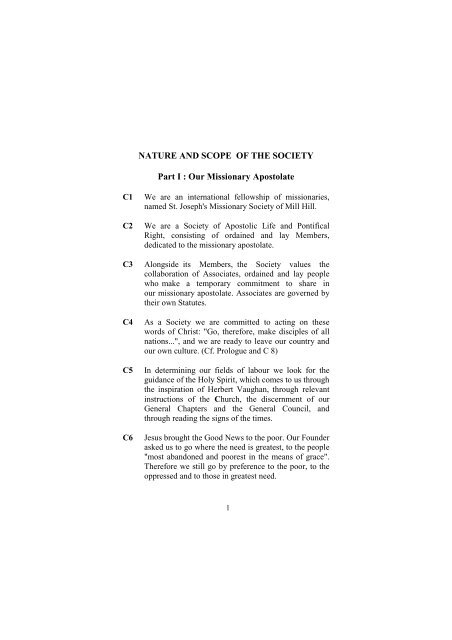
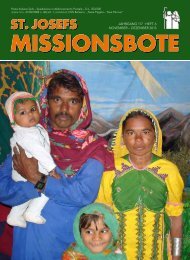
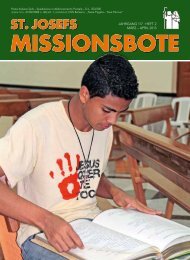
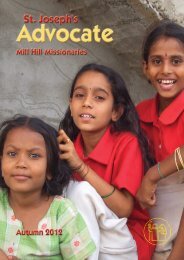


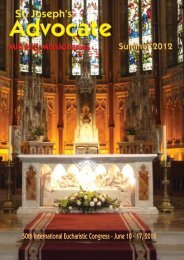
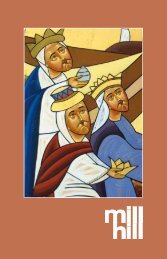
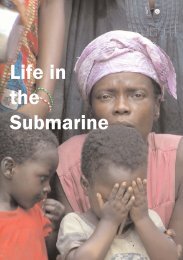
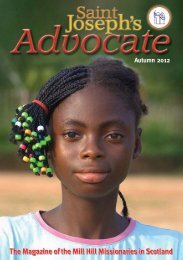
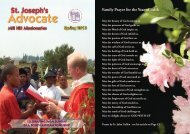



![Summer 2012 [pdf] - The Mill Hill Missionaries](https://img.yumpu.com/43011464/1/184x260/summer-2012-pdf-the-mill-hill-missionaries.jpg?quality=85)